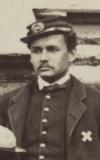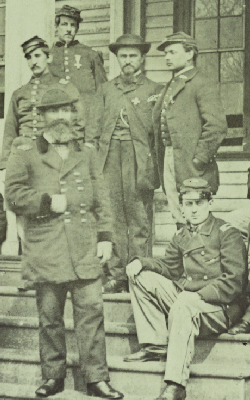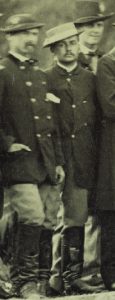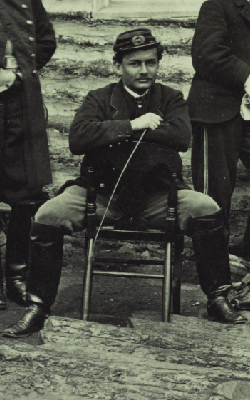McClellan’s Brother

The official reports from the Sixth Corps are woefully incomplete for the 1864 Overland Campaign. Many officers waited until the fall to write and by then the entire organization had seen significant change, eliminating any chance for full reports. After the death of John Sedgwick on May 9, Horatio Wright took command of the corps and he is among those who did not even submit anything. I have hit nothing but dead ends on my wild goose chase to track down worthwhile manuscripts from Wright and have moved on to seeing if I can glean anything from his staff.
There seems to be more signs of promise here, particularly with aide-de-camp Arthur McClellan—whose papers are at the Library of Congress, lumped into the collection of his more famous brother. Arthur’s story seems interesting enough on its own and another return visit to the Library of Congress just jumped to the top of my Sixth Corps research list. For now, I’ll present what material I have gathered from elsewhere as a starting point on the life and military career of Arthur McClellan.
Dr. George McClellan (1796-1847) graduated from Yale University and received a medical degree from the University of Pennsylvania. He was a prominent Philadelphia physician and founded the Jefferson Medical College. He married Elizabeth Steinmetz Brinton (1800-1889) in 1820 and the couple had five children: Frederica Sophia (1821-1899), John Hill Brinton (1823-1874), George Brinton (1826-1885), Arthur (1839-1904), and Mary Phillips (1832-1895).
Arthur McClellan was born in Philadelphia on September 23, 1839. Like his father, he attended the University of Pennsylvania but elected to study science and civil engineering. Known as “a scholar of rare ability,” he belonged to the Eta chapter of the Delta Phi fraternity. Arthur graduated with a bachelor of arts in 1858 and a master of arts in 1861 and lived on 1915 Spruce Street. During the latter part of his education he also worked as a civil engineer for his brother George, then president of the Illinois Central Railroad.[1]
Arthur was among the first to enlist in the army at the outbreak of the Civil War. On April 25, 1861 he mustered into service as a private in Company F of the 17th Pennsylvania Infantry. The regiment was a three-month outfit with enlistments set to expire in late July so it did not fight at First Bull Run. They volunteered to remain around Washington for another week to keep the capital safe but then mustered out in early August. George had arrived by that time to take command of the Army of the Potomac and he appointed Arthur as captain and aide-de-camp on his staff. The younger brother seemed to thrive in his new role. “Arthur is doing very well & will make an excellent soldier,” George wrote in November. A postwar newspaper had a similar assessment, stating that due to his “military knowledge and skill,” Arthur’s “worth and merit as a strategist soon became recognized.”[2]
Arthur remained on his brother’s staff until George was relieved of command in early November 1862. He received instruction to remain with his brother and delivered George’s final report on his tenure as army commander the following summer. He then sought reentry into the Army of the Potomac. “I hope they will put Arthur on Sedgwick’s staff & I presume they will,” George wrote on August 9 and he soon got his wish.[3]

Arthur joined the Sixth Corps staff and served under John Sedgwick and Horatio Wright. He received fair appraisals from other officers. Lieutenant Colonel Theodore Lyman, of George Meade’s staff, called him “a very nice fellow” and Lieutenant Colonel Thomas W. Hyde, of Wright’s staff, afterward referred to him as “Arthur McClellan, who knew no fear and against whom has never been reproach.” Despite his demonstrated ability and bravery, Arthur was not outspoken in seeking acknowledgment. A colleague after claimed: “Many stories of his quiet pluck were told by old comrades, but none ever by him, as he was one of the most reticent and modest of men.”[4]
McClellan had four horses shot underneath him during the 1864 Overland Campaign, occurring May 6 at the Wilderness, May 18 at Spotsylvania, May 23 at North Anna, and June 3 at Cold Harbor. Hyde recalled the second death. “Arthur McClellan’s bay horse had a shell pass directly through him as I happened to be looking. The distressing cry seemed to tear our ears, while the collapse of the beautiful animal was a picture of pain framed by the smoking forest.” Many newspapers highlighted his bravery during this campaign but some acknowledged the politics and name association that kept Arthur’s career grounded. “But for his unfortunate relationship, he would have been promoted long ago,” noted a Columbus, Ohio paper.”[5]
Though not outspoken in camp, Arthur expressed his opinions on the war in private letters to George. “It has been nothing but attack—attack—assault through jungles & swamps against positions of which we knew nothing,” he wrote on June 27, 1864. “I believe that sixty thousand men have been uselessly slaughtered. Even your bitterest enemies cannot fail to see, though they do not acknowledge, how completely you have been vindicated.” Dismayed by Lincoln’s victory over his brother in the election that fall, Arthur suggested to George that he wanted to leave the army. “If the people have been blind enough to wish for four more years of the present dynasty they deserve to suffer,” he wrote on November 12. “At any rate you have lost no dignity by defeat and your way of managing the campaign will contrast favorably with Mr. Lincoln’s.”[6]

George convinced his brother to remain in the army, and with political fallout no longer a concern Arthur finally started receiving his delayed promotions. He was brevetted major “for faithful and meritorious services in the field during the present campaign before Richmond, Virginia, and in the Shenandoah Valley, to date from October 19, 1864.” A postwar obituary stated: “His conduct throughout the entire period of the Civil War was marked by conspicuous gallantry and unflinching devotion to the perils and hazards of the cause of the North. Nothing marred his brilliant military record and he was spoken of and regarded by his superior officers and men beneath his grade as one of the bravest officers who ever unsheathed a sword.” The following March Arthur became full major and aide-de-camp for Wright and was greatly involved in the war’s final act.[7]
On March 25, 1865, a large portion of the Confederate army attacked the Union lines east of Petersburg, overrunning Fort Stedman but failing to advance significantly further. Wright sent several staff officers, including Arthur, to the eastern front to guide the Sixth Corps reinforcements when they arrived. The Ninth Corps recaptured their own lines before any of Wright’s infantry arrived, but McClellan nevertheless played a role in the counterattack. New York Herald correspondent Charles H. Hannam wrote: “In the final charge Major Arthur McClellan, of General Wright’s staff, and Captain A.M. Tyler, of General Wheaton’s staff, took part, and a rebel colonel surrendered to them.” Chaplain Brant Coryell Hammond, 5th Wisconsin Infantry, explained: “They arrived at daylight, and at once encouraged an attack upon the rebels in the front, leading the same, Capt. Tyler himself capturing a ‘last ditch’ Colonel of a South Carolina regiment. Thus did our immortal 6th corps do herself honor, by these daring men.”[8]
The Sixth Corps attacked the Confederate picket line southwest of Petersburg that afternoon. They overran the South Carolina sentries near the Jones Farm and then resisted a valiant but futile charge by two Georgia regiments. Two days later the two sides agreed to a temporary truce to recover the bodies of those killed on the 25th. Captain John T. Hardeman, 45th Georgia Infantry, claimed that he met Arthur during this brief ceasefire, writing: “He [McClellan] said he never saw men fight as we did on Saturday. He gave us the credit of being the most gallant, if not the most desperate fighters, he ever saw, or rather that ever fought his command.”[9]
Wright sought to use the position seized from the Rebel pickets as a staging ground for an assault on the main Confederate line. The enduring legacy of the final attack at Petersburg is a misleading story that Horace Porter, of Grant’s staff, rode from Five Forks to deliver a message about the Union victory there and that it was not until that news reached army headquarters that an attack was considered. Meade, however, had given Wright authorization at 4 p.m. on April 1 to attack the following morning. McClellan delivered specific orders for Truman Seymour’s Sixth Corps division and the timing of his arrival provides further proof of this sequence.
Colonel Joseph Warren Keifer commanded a brigade in Seymour’s division and was in the middle of writing a letter to his wife on the evening of April 1. “We are again packed and ordered to assault the enemy’s main works at dawn tomorrow. I think we shall be successful. The officers and men are in fine spirits,” he wrote until Arthur rode up with an update. “Maj. McClellan from Corps Head Quarters has just reported to me to prepare to attack at once. He also informs me that Genl. Sheridan with his cavalry has captured 4,000 prisoners upon the left & is now pushing. We may not have to make the assault.”[10]
Despite Keifer’s hope that Sheridan had scored the knockout blow, saving the Sixth Corps from a costly charge, Grant wisely choose to amend Meade’s previous orders to now include full-scale attacks all along the line. Wright’s men achieved the decisive breakthrough the following morning. McClellan appeared to accompany Keifer’s brigade during this charge on April 2. Captain Erasmus Snow Norvell commanded the brigade pioneers. He recalled:
“After we got the rebel lines broken, captured, or otherwise disposed of, we went straight ahead, seeking whom we might devour, toward the South Side Railroad. There was nothing in our front, so we went pretty lively for some distance, in fact, clear to the South Side Railroad. There were about 500 men, I suppose, who reached the railroad; two of us being mounted, Major McClellan (brother of Gen. George B. McClellan) and myself. On arriving at the railroad, we began to look around, and found that we were nearly out of sight of the main line, which had faced to the left. Maj. McClellan, being the ranking officer, said: ‘I will go back and report, while you remain here with the men, and I will wave my hat to you if we are to go back.’”[11]
During his return to the main lines, Arthur would have passed close by the spot where John Mauk shot and killed A.P. Hill that morning. By the afternoon the Sixth Corps had firmly gained a position on the Appomattox River west of Petersburg. This forced the Confederates to evacuate north across the river and then take a longer route to the rendezvous at Amelia Court House. McClellan and the Sixth Corps marched directly west and helped cut the Army of Northern Virginia’s desired path at Jetersville, forcing another roundabout march to the west that culminated at Appomattox.

While most of the Union army soon afterward returned to Washington for a grand review and honorable dismissal, the Sixth Corps remained in southside Virginia on mop-up detail. As soon as Wright learned about Joseph Johnston’s surrender on April 26, he sent an expedition to Greensboro, North Carolina to demand its surrender and hold the city until William Sherman’s army arrived. McClellan and Lieutenant Colonel Walter S. Franklin (the younger brother of another notable Union general, William Buel Franklin), led a squad of about a hundred soldiers from Danville to take command of Greensboro.
They took the railroad for the first thirty-five miles but soon found the tracks destroyed by a cavalry raid and had to walk the rest of the way. Johnston had meanwhile taken up temporarily residence in Greensboro, as had P.G.T. Beauregard, and the Federals found them “living in strict seclusion.” The Confederate generals hospitably received the staff officers. Beauregard apologized that he could not find horses for their accommodation in town but placed two of his finest mules at their disposal. Though not documented, I think it is a fair guess to assume that the southern generals probably prodded Arthur and Walter with a few questions about their famous older brothers.[12]
Arthur reached the rank of brevet colonel before mustering out and settling in Drifton, Pennsylvania. There he worked for his cousins at the Coxe Brothers’ Company, a coal mining and railroad operation. He served as a telegraph operator, purchasing agent, and superintendent. A local paper wrote in 1886 that McClellan “is a man of careful instincts and a peculiar talent for management, which makes his services invaluable. Ten years later an industry journal stated, “He is now one of the managers of the company, and looks as youthful as he did 25 years ago, retaining his customary good nature and pleasant smile.” Upon his death the following decade, a local paper declared he was “one of the best known men in mining and railroad circles.”[13]
Arthur joined the membership ranks of the American Institute of Mining Engineers in 1871. “He was a man of sterling worth,” they recalled of him. “In times of disturbance or strikes at the works, on several occasions he risked his life with the utmost coolness, giving an example of quiet courage that was invaluable, while his knowledge, experience and ability won a wide admiration and respect.”[14]
McClellan did return as a visitor to some of the places where he had fought during the Civil War. In 1894 he served on his home state’s commission to assist the National Antietam Board in locating Pennsylvania regiments on the battlefield. Three years later a Richmond newspaper noted that Arthur was in Petersburg to see the battlefields around the city. During his stay he was hosted by George Cameron, a prominent tobacconist who had served in Petersburg’s Confederate militia during the war and was captured on June 9, 1864 at the battle of Old Men and Young Boys.[15]
Arthur was a devout and active member of St. James Episcopal Church and served as a trustee for the State Miners’ Hospital in Hazleton. It appears that he never married. He died of heart disease at the age of sixty-five on February 22, 1904, and was buried in Philadelphia’s Laurel Hill Cemetery.[16]
Sources:
[1] Mrs. Franklin Q. Brown, “Dr. George McClellan: A Sketch of an Eminent Philadelphia Physician,” The Independent, May 29, 1913.
[2] George B. McClellan to “My dear Mother,” November 9, 1861. Quoted in Stephen W. Sears, ed., The Civil War Papers of George B. McClellan: Selected Correspondence, 1860-1865 (New York: Ticknor & Fields, 1989), 623 “Distinguished Family,” Wilkes-Barre Record, February 24, 1904.
[3] George B. McClellan to “My dear Mother,” August 9, 1863, Sears, 556.
[4] George R. Agassiz, ed., Meade’s Headquarters, 1863-1865: Letters of Colonel Theodore Lyman from the Wilderness to Appomattox (Boston: The Atlantic Monthly Press, 1922), 112. Thomas W. Hyde, Following the Greek Cross, Or, Memories of the Sixth Army Corps (Boston: Houghton, Mifflin and Company, 1897), 210. “Biographical Notices of 1904,” Bi-Monthly Bulletin of the American Institute of American Engineers Number 4 (Philadelphia: American Institute of Mining Engineers, July 1905), 775.
[5] Hyde, Following the Greek Cross, 204. “Captain McClellan,” Daily Ohio Statesman, June 14, 1864.
[6] Arthur McClellan to George B. McClellan, June 27, 1864, George B. McClellan Papers, Library of Congress. Quoted in Jennifer L. Weber, Copperheads: The Rise and Fall of Lincoln’s Opponents in the North (Oxford: Oxford University Press, 2006), 139. Arthur McClellan to George B. McClellan, November 12, 1864 George B. McClellan Papers, Library of Congress. Quoted in Sears, The Civil War Papers of George B. McClellan, 623.
[7] Edwin M. Stanton to Abraham Lincoln, December 12, 1864, Journal of the Executive Proceedings of the Senate of the United States of America From December 5, 1864, to February 6, 1866, Inclusive Volume 14, Part 1 (Washington, DC: Government Printing Office, 1887), 61. “Distinguished Family,” Wilkes-Barre Record, February 24, 1904. Stanton to Lincoln, March 7, 1865, 249.
[8] “The Ninth Corps,” New York Herald, March 28, 1865. B.C. Hammond to “Messrs. Editors,” March 26, 1865, “From the Sixth Corps,” Wisconsin State Journal, April 4, 1865.
[9] Jno. Hardeman to “Dear Captain,” March 28, 1865, “In the Trenches Near Petersburg, Va.,” Macon Telegraph, April 13, 1865.
[10] Joseph Warren Keifer to “My Dear Wife,” April 1, 1865, Joseph Warren Keifer Papers, Library of Congress.
[11] E.S. Norvell, “Petersburg: A Maryland Comrade’s Account of the Sixth Corps Operations,” National Tribune, June 11, 1891.
[12] “From the Sixth Corps.” Vermont Watchman and State Journal, May 19, 1865. Charles H. Hannam, “Occupation of Greensboro,” New York Herald, May 8, 1865.
[13] “County,” Pittston Gazette, February 24, 1904. “Drifton: The Model Mining Town of the Anthracite Region,” Wilkes-Barre Evening Leader, August 26, 1886. “Early Days of the Drifton Colliery,” The Coal Trade Journal, February 19, 1896. “Distinguished Family,” Wilkes-Barre Record, February 24, 1904.
[14] “Biographical Notices of 1904,” 775.
[15] “The Commission to Locate Positions at Antietam Appointed.” Philadelphia Times, September 27, 1894. “Petersburg’s Gay Set,” Richmond Times, April 25, 1897.
[16] “Capitol Hill,” Harrisburg Telegraph, August 19, 1896. “Major Arthur McClellan Dead,” Philadelphia Inquirer, February 23, 1904.
Outstanding article; thanks for posting this.
Lots of great stuff–thanks!
Here is your book! We have dissected all the A-list players until there is little left. Now we need to know about these other men–get to work!
Wow, great article! I had no idea McClellan had a brother, or that he was at the Siegr of Petersburg, until today. I also applaud your determination to go beyond the typical sources to try to learn something new about the Sixth Corps’ role at Petersburg.
I used to belong to AIME (American Institute of Mining Engineers). What an informative article.
This is one of the best I have seen on ECW this year. Love his take on the Overland Campaign. It undermines the current historical consensus that it was a Union “victory.” Solders letters usually portray something quite different.
Thank you for the fruit of your research efforts. This article shows there is a fine tree behind this fruit and more good works ahead. Good luck with the VIth, too.
I found the article about my great-great grandmother Frederica Sophia McClellan’s brother fascinating. Frederica named her second son for him. He was named Arthur McClellan English. Frederica’s fourth daughter, Agnes McClellan English, was my great-grandmother. She married Andrew Henshaw Torrey.